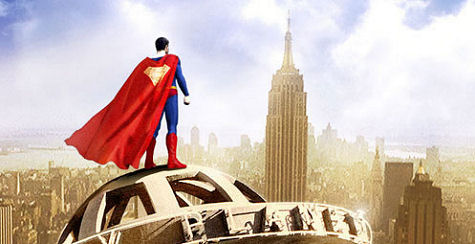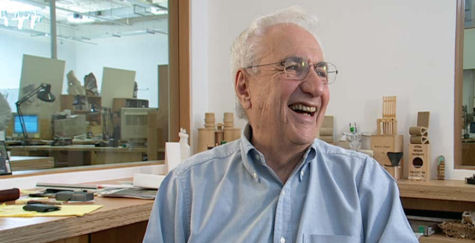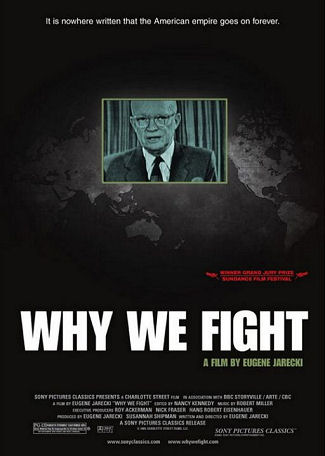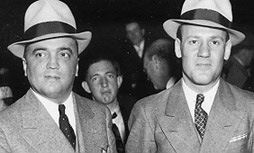The late composer Bernard Herrmann “made life easier for good films,” says David Thomson in a recent Guardian piece. Many Alfred Hitchcock films in particular — Vertigo, Psycho, North by Northwest (the final act of this film is nearly a Hermann symphony in itself), The Man Who Knew Too Much — as well as Citizen Kane, Taxi Driver, The Day The Earth Stood Still, et. al. This may sound insignificant, but I feel Hermann’s most delicious accomplishments are his incidental mood pieces in thrillers, in particular the ones that seem to say “be careful…bad stuff could quite easily happen to this character.” Here are three sublime samples from that closing portion of North by Northwest…they take you right into the film. Thomson apparently got on the Herrmann topic because the San Francisco Symphony (under Michael Tilson Thomas) will perform some Hermann compositions next July (or were they performed last July?…can’t quite follow). Herrmann would probably be perplexed, Thomson feels. “A tribute? Thank you, very nice, but no cigar. Why are you playing the music without the movie? Don’t you get it — they are married. They want to be in bed together.”
Month: June 2006
Slacker Town
This is a good Nikki Finke satire piece because it’s grounded in fact. Hollywood is Slacker Town. Almost everyone works long hours — twelve-hour days are fairly standard — but too many in the upper echelons overcompensate by taking extended vacations (“working” or otherwise) that eat up huge chunks of the calendar. Finke’s piece was triggered by news that “some Hollywood types [are] already leaving town for the July 4th holiday.” I’m guessing that the big vacation-takers are those with school-age or younger kids, and I can relate to that. But at the end of the day (especially these days) I subscribe to words that David Mamet wrote 20 years ago for an episode of Hill Street Blues: “I went to sleep dreaming life is beauty — I woke the next day knowing life is duty.” Life is short, we’re all strutting and fretting our hour upon the stage, and either you get it or you don’t. Better creative work is done on less-full stomachs and less vacation money to draw upon, but of course (and this is the bottom line) most of the folks in this town aren’t in it for the creative highs but the money saunas. How many people in this town would do what they do if the bucks weren’t quite as flush? How many are in it for the work itself rather than the creamy compensatory comforts? You know Jack Black would be Jack Black no matter what, but could the same be said of Gail Berman or Brad Grey or Ron Meyer or a hundred others I could name? If Hollywood were to suddenly become socialist and adopt the salary plan that the London magazine Time Out had around 1980, which was that everyone earned the exact same salary, you would see an exodus like nothing since Moses led the Jews out of Egypt. (For the record, HE’s work day is 15 to 16 hours if you count screenings. Longer if you count DVD-watching, primarily a relaxation thing but one with occasional work-related aspects.)
Hailing “Petulia”
Richard Lester‘s Petulia “is essentially about two lonely and bored people desperate to find passion in an increasingly dispassionate world,” writes DVD Savant. “The ’60s-drenched setting is tapped to add shadings of meaning, but it nevertheless remains a backdrop. Indeed, much of Petulia‘s genius stems from such shadings, particularly stylistic flourishes that result in a work of stunning freshness — even nearly 40 years after its theatrical release. This keenly observed art film finds the counterculture of that era being swallowed up and taken over by a nation of overwhelming wealth, commercialism and consumerism. Lester might not have known it at the time, but when he ventured to San Francisco in 1967 to shoot Petulia, he was creating one of the great cinematic time capsules of a watershed period in American society.”
Dretzka Fellates “Kiss”
Shane Black, director-writer of Kiss Kiss Bang Bang, has written “against type by skewering the conventions of noir fiction in a movie that wouldn’t make sense without a comprehensive awareness and palpable appreciation of each and every one of them,” says MCN’s Gary Dretzka. “As such, Kiss Kiss Bang Bang favorably recalls Robert Altman’s The Long Goodbye.” Get outta town! If Black’s film had one-fifth of the funky, bumbling neo-noir charm of The Long Goodbye, it would have been far more intoxicating. If nothing else, Kiss Kiss Bang Bang seems totally stoned on how wise-ass clever it is, especially the dialogue. The Long Goodbye never once grabbed you by the lapels and said, “You’re watching a very hip, ahead-of-the-curve film here!” Either you got the unforced charm of it or you didn’t…Altman seemed to be cool either way.
Dissing Sandler’s “Click”
Didn’t make it to Monday’s all-media screening of Adam Sandler‘s Click, but a knowledgable industry friend did, and here’s his verdict: “It’s okay but not that great. I don’t know what to make of the audience reaction because these screenings are so heavily recruited with people off the street, but there wasn’t overwhelming laughter in the press section. It’s a typical downmarket Sandler movie, the kind he does when he’s not being directed by Paul Thomas Anderson or Mike Binder or James L. Brooks. He’s got complete control and his team putting it all together — director Frank Coraci, producer Jack Giarraputo — so it has that mix of over-the-top comedy (Sandler never knows when to stop with this) and schmaltz…broad gross-out comedy that turns on a dime into sentimental slop. Amd I’m sure he and his team and Columbia will be rewarded with great success for this. It’s always interesting to see what Sandler comes up with on his own. This is a competently made film, and Corachi is one of his stable of directors that he hires, and the studio doesn’t want to tell him anything different because he’s so successful. It’s basically about what would you learn if you fast-forwarded through your life, and he definitely lays it on during the last half hour, especially with the prosthetics. It’s a little bit like Ebenezer Scrooge being shown what’s to come by the Ghost of Christmas Future. You laugh at certain parts, but it’s more of a short-film premise than a feature — after a half hour or so it starts to wear down. There’s no even tone throughout this picture…it’s all over the place. And the product placement stuff on behalf of Bed, Bath and Beyond is unbelievable. ”
Plummeting “Cars”
“[Disney distribution execs] originally expected that Cars would only start to fade once Adam Sandler‘s Click opened in theaters this coming Friday. That teens and young adults would favor that film over ours. But that was okay because we’d still pretty much have the family audience all to ourselves until Superman Returns opened five days later. But to have ticket sales fall off by 43% in our second weekend and to almost lose the top spot to a Jack Black wrestling comedy …nobody here ever saw that coming. This was a film that was initially projected to do over $300 million domestic. Last week, that number got pushed back to $250 million. Today, I’ve got people asking me if I think Cars is actually going to be able to make it to $200 million domestic. And right now, to be honest, I don’t know. I’m hoping that Cars can pull in another $50 or $60 million by next Wednesday. But after Superman Returns opens, we’re officially toast. With Dead Man’s Chest opening 9 days after that, there’s no way that Cars is going to do any significant repeat business this summer. This time around, the competition is just too strong.” — a Disney insider talking to Jim Hill in his “Mousewatch” column.
Friedman’s “Vice” Diss
For those who’ve happened across that Roger Friedman item that passes along bad reports about Michael Mann’s Miami Vice (Universal, 7.28), I have two responses. One, Mann is absolutely incapable — strategically, emotionally, psychologically, physiologically, technologically — of making a bad film. Even if Vice turns out to be one of his lesser efforts, by Mann’s Olympian standards that will still make it an exceptional ride. And two, keep in mind what F.X. Feeney, who’s seen a cut of the film, had to say last week. The film, Feeney claims, “draws on wellsprings of romantic passion that haven’t surfaced this vividly in Mann’s films since Last of the Mohicans. Two kinds of passion are represented — you have a stable relationship between Jamie Foxx (as Tubbs) and Naomie Harris as the fellow undercover cop, who are trying to make love work in the dangerous arena of undercover work, and then you have Colin Farrell as Sonny Crockett pursuing a dangerous liason with Gong Li, the wife of a stateless plutocrat who rules in the triborderarea.” The films is about “the psychological cost of working undercover, of leading a life in a mask for months on end, of behaving in terms of ‘impulse without inhibition.’ So Crockett must answer to a spontaneous passion while Tubbs must secure a more traditional, if endangered, one. This balances the Tubbs/Crockett partnership in fresh, unpredictable ways I don’t recall from the series.”
Hollywood is Predominantly White
The non-white Hollywood-suit head count is “pretty dismal,” reports L.A. Times industry columnist Patrick Goldstein . “A survey of African American or Latino production executives at a vice president level or higher found one executive at 20th Century Fox, New Line and Paramount, none at Universal, Warner Bros. and Sony Pictures. After three days of trying, I couldn’t get an answer out of Disney’s corporate publicity staff, so I’m guessing they’re at zero too. Whenever I would ask studio chiefs for an explanation, there was usually a long, awkward silence.”
Six Months In
Six Months In
We’re just about at the ’06 halfway mark, and it’s time for a basic sum-up.
By this site’s yardstick there have been 10 A-listers, 15 honorable B-listers, and 9 half-decents. A total of 34 films — a bit more than one per week since the year began — that were either excellent or very good or respectable, or at the very least mildly pleasing.

An Inconvenient Truth
My choice for the best film of the year so far, no question, is Paul Greengrass’s United 93 — a film that many, many people still don’t want to see, but is truly a pulse-pounder for the ages, in part because it’s so stunningly well-made, but mainly because the extraordinary craft manifests in all kinds of haunting ways.
Composed of a thousand details and a thousand echoes, United 93 is a film about revisiting, recapturing, reanimating…about death, loss and a portrait of heroism that, for me, was too much to absorb in a single viewing. I’ve seen it five times, and I can’t wait to watch and re-watch the DVD.
< ?php include ('/home/hollyw9/public_html/wired'); ?>
The first runner-up is Eugene Jarecki’s Why We Fight. It’s not the first doc to ask and explore why so many people around the world despise the U.S. of A., but it’s surely one of the most precise and persuasive. By delivering a cleanly composed, ultra-perceptive explanation of how the American military-industrial complex runs the whole foreign policy show, from the leanings of the U.S. President to the Congress and right on down the food chain, it burns right through to the nub.
The third best so far is Bryan Singer’s Superman Returns, a revisiting that feels freshly felt as well as a heart movie with a personal stamp that just happened to cost $260 million (or whatever the actual figure is) to compose. It’s a deeply satisfying upgrade, a reverent nostalgia piece, an above-average chick flick, a sumptous and harmonious piece of work and, frequently enough, a solid action thriller.

Fourth on the list is Sydney Pollack’s Sketches of Frank Gehry — a stirring, hugely likable portrait of the most daring and exciting architect of our time. I wrote this during the Toronto Film Festival, and nine months later I feel the same way: “Corny as this sounds, Sketches left me with a more vivid feeling of celebration and with more reasons to feel enthused and excited about life than anything I’ve seen [in a long while].”
Fifth in line is Davis Guggenheim and Al Gore’s An Inconvenient Truth, and yes, I’m applying special criteria here. It’s among the five best not just because it’s a movie that stirs and sinks into your soul (if you don’t feel this movie there’s some- thing seriously detached inside), but because it’s flat-out the most important flick of the year.
I’m listing it among the top five, in short, because more people need to see it because the sell is far from complete, especially with so many skeptics and corporate doubt-spreaders spinning against it as we speak.
I’m just going to list the ’06 films that have popped through over the last two or three hours. I’ve only listed 28 films on top of the 34 in the first three categories. I’m sure I’ve forgotten a gem or two, and I’ve probably overlooked some half-worthies.

Frank Gehry
Scoldings and admonishings are, of course, necessary and welcome.
TEN BEST SO FAR: United 93, Why We Fight, Superman Returns, Sketches of Frank Gehry, An Inconvenient Truth, Tsotsi, Find Me Guilty (a triumphant return to form for director Sidney Lumet), V for Vendetta, The Three Burials of Melquiades Estrada, Bob Dylan: No Direction Home (the best Martin Scorsese film since Goodfellas).
GOOD, STURDY, HONORABLE (15, in no particular order): Neil Young: Heart of Gold, Inside Man, Running Scared, The Devil Wears Prada, Leonard Cohen: I’m Your Man, The Break-Up, Favela Rising, Mission Impossible 3, Ask the Dust, Akeelah and the Bee, Bubble, Thank You for Smoking, Our Brand is Crisis, Sophie Scholl — The Final Days, Mozart and the Whale.
OKAY, PASSABLE, TOLERABLE (9, in no particular order): Down in the Valley, Nacho Libre, The Omen, Poseidon, Glory Road, Firewall, Imagine Me & You, Kinky Boots, Free Zone.
UNDERWHELMING (8): X-Men: The Last Stand, Tristram Shandy: A Cock and Bull Story, 16 Blocks, The Notorious Bettie Page, Lonesome Jim, Cars, Friends with Money, Lucky Number Slevin.
DIMINISHES A BIT MORE EVERY TIME I THINK ABOUT IT (1): The Road to Guantanamo.

OVERRATED IN SOME QUARTERS (5): The Proposition, Lady Vengeance, Battle in Heaven, Brick, The Devil and Daniel Johnston.
DISAPPOINTING (especially coming from a brilliant writer-director who’s done much better work): Looking for Comedy in the Muslim World.
NOT VERY GOOD…KINDA BAD, ACTUALLY (1): The Da Vinci Code.
WORST (3): RV, Basic Instinct 2, American Dreamz.
BEYOND DISSECTION (1): Tyler Perry’s Madea’s Family Reunion.
Corliss on “Superman”
“Earlier versions of Superman stressed the hero’s humanity: his attachment to his Earth parents, his country-boy clumsiness around Lois,” writes Time‘s Richard Corliss. But Bryan Singer’s Superman Returns “emphasizes his divinity. He is not a super man; he is a god (named Kal-El), sent by his heavenly father (Jor-El) to protect Earth. That is a mission that takes more than muscles ; it requires sacrifice, perhaps of his own life. So he is no simple comic-book hunk. He is Earth’s savior: Jesus Christ Superman .”
Love Lies Bleeding
Romantic movies with happy blue-sky endings don’t resonate. The ones that sink into people’s souls are about love lost at such a cost. That’s the enduring thing, the special alchemy. If, say, J. Edgar Hoover and Clyde Tolson had been forced apart by fate, you’d have a movie. But they were close and pretty much inseparable their entire lives…flatline.

You’d think that somewhere in Borys Kit‘s Hollywood Reporter story somebody would have mentioned this, and perhaps commented on what I suspect is a reluctance to buy into the sad-is-better idea on the part of producers and female moviegoers. Everybody wants love and happiness and white-picket fences, but movies that grab you and pay off are never finally about characters fulfilled.
Evolving Formats
The Spokesman-Review‘s Frank Sennett writes about formerly print-influenced news and opinion sites — this one included — morphing into blog streams.
